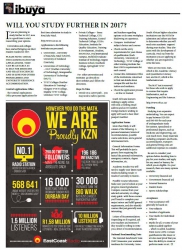African Renaissance - Will you Study further in 2017?2016-05-20 If you are planning to study further in 2017, now is a good time to start researching your options.
Universities and colleges have started bringing out their Student Guides for 2017. Please note: Check the closing dates for app lications. They can be as early as 31 May for Medicine and Health Sciences and 30 June for other programm es and University residence acc omm odation. Central Applications Office The Central Applications Office processes applications for first time admission to study in KwaZulu-Natal. http://www.cao.ac.za Applications to the following institutes are processed:
Steps To Take
Application Forms More than likely, it will consist of the following: A personal statement, letters of recommendation, possible course selections, and a general information form. General Information Forms: This will probably be just a generic form requiring the basics like personal information, emergency contacts, degree information, etc. Academic Results You will need to supply your latest exam results including Grade 11 results if currently in Matric. Possible Course Selections: Make sure you’ve looked at your progress toward graduation. Compare courses from your selected university or college study guide with those courses you’ll need to complete your major/ minor and fulfill general requirements, and also identify courses that just generally seem interesting. Letters of Recommendation: Depending on if required, ask your teachers and mentors if they would be willing to write you a letter of recommendation. National Benchmarking Tests The National Benchmark Tests (NBT) measures your academic readiness for University. Some South African higher education institutions use the NBTs for admission and others use them to determine whether you will need extra academic support during your studies. They also assist with the development of curricula. Find out from the institution you are applying to whether you are required to write the tests. There are two tests: AQL, which is the Academic Literacy and Quantitative Literacy test, and MAT, which is the Mathematics test. The MAT test is reserved for those who wish to apply to courses that require Mathematics, such as Engineering and the Sciences. http://www.nbt.ac.za/ Funding Studying is an expensive undertaking. You can expect to pay between R20 000 and R40 000 for each year of undergraduate study for tutition. Specialised or professional degrees, such as medicine and engineering, can cost much more. Study materials including computers and books, accommodation, transport and general living costs are additional expenses to consider. Be sure to consider your options before deciding how to pay for your studies, and apply for any award or bursary for which you›re eligible. Do your research, there are many options available:
|
African Renaissance - Will you Study further in 2017?
Copyright © 2024 KwaZulu-Natal Top Business
